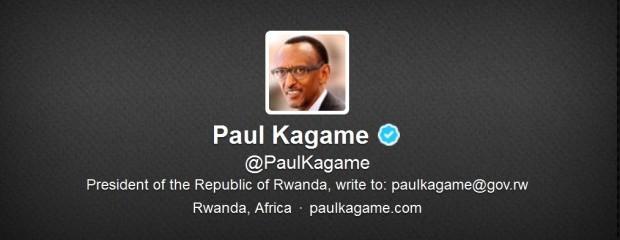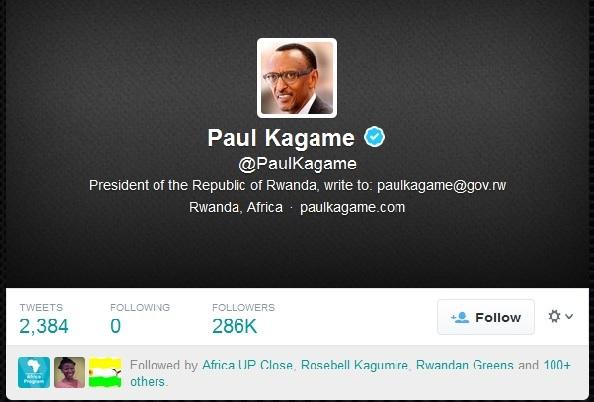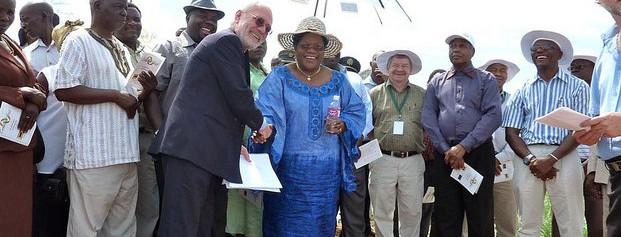Rwanda’s Twitter-Gate: The Disinformation Campaign of Africa’s Digital President – By Susan Thomson

 As Rwanda prepares to mark the twentieth anniversary of the 1994 genocide, it has found itself in an unprecedented diplomatic crisis. The ruling Rwandan Patriotic Front has all but claimed responsibility for the murder of its former Spy Chief Patrick Karegeya in Johannesburg in January. More recently, the South African government has accused Rwandan diplomats of a third bungled attempt on the life of the country’s former army chief Kayumba Nyamwasa. The State Department scolded the government of President Paul Kagame for the attempt. The South African government then expelled three Rwandan diplomats, and is considering ending formal diplomatic ties with Rwanda.
As Rwanda prepares to mark the twentieth anniversary of the 1994 genocide, it has found itself in an unprecedented diplomatic crisis. The ruling Rwandan Patriotic Front has all but claimed responsibility for the murder of its former Spy Chief Patrick Karegeya in Johannesburg in January. More recently, the South African government has accused Rwandan diplomats of a third bungled attempt on the life of the country’s former army chief Kayumba Nyamwasa. The State Department scolded the government of President Paul Kagame for the attempt. The South African government then expelled three Rwandan diplomats, and is considering ending formal diplomatic ties with Rwanda.
Foreign journalists reporting on the attack on Nyamwasa raised the ire of President Kagame. On March 7, Radio France International journalist Sonia Rolley was subject to misogynistic harassment from the account of @RichardGoldston. American freelancer Steve Terrill came to Rolley’s defense, resulting in a series of mocking tweets from the account of Rwanda president @PaulKagame himself, not the @RichardGoldston to which Terrill (@steveinafrica) had directed his Tweets. A week later, on March 15, Terrill was denied entry into Rwanda. The denial appears politically-motivated as Terrill broke the story that someone in the office of the Rwandan president also had access to the @RichardGoldston account. The @RichardGoldston account trolled Twitter for any sign of criticism of Kagame or the RPF, and regularly harassed and demeaned Twitter users that criticized the government.
On March 8, the official Twitter account of the Office of the Rwandan President (@UrugwiroVillage) tweeted that the @RichardGoldston account had been deleted and the staff member responsible for the account had been “reprimanded”.
Rwanda’s Twitter-gate raises questions about the central role of RPF Twitter-trolls in calling out foreign journalists who seek to hold it to account for its excesses at home and abroad. President Kagame’s reactionary tweets provide insight into the political reality behind his government’s carefully crafted narrative that Rwanda is a nation rehabilitated from the ruin of the 1994 genocide. Twitter-gate is also illustrative of the harassment and intimidation which critics of the RPF regime regularly experience.
Twitter-gate is the first crack in the armor of the RPF’s longstanding disinformation campaign that has relied on exchange students, public relations firms, commemorative events, and a whole host of other techniques to craft an idealized and often invented version of what Rwanda was like before the onset of colonialism and what it has become since the 1994 genocide.
Since 2009, the RPF has worked with American and British PR specialists whose primary task is to drown out the voices of foreign critics and bury evidence of the RPF’s human rights abuses under rosy language about political stability, economic growth, and the stated intention of helping the poor. In January, Rwanda launched the Kwibuka20 campaign, from inside Kagame’s office of course, for the same instrumental reason: to substitute the trope of genocide for the trope of authoritarianism in narratives about Rwanda.
The disinformation strategy is simple: ensure maximum international sympathy and donor dollars and a minimum of international inquiry into the government’s denial of liberties and human rights abuses. The Kagame-led regime has a penchant for U.S. visits and visitors, and until recently successive U.S. administrations turned a blind eye to massive human rights violations for which the Kagame-led regime, according to the United Nations, is responsible in the Democratic Republic of the Congo. Americans in particular have been taken in by the rhetoric of reconstruction, development, and reconciliation that invariably accompanies most public events in the country.
The RPF frames itself for Western audiences as the political party best able to move Rwanda towards a Western-style democracy because it has regularly held presidential and parliamentary elections. The RPF handily won the most recent round of parliamentary elections, in September 2013, with 76% of the vote. In theory, it was contending with nine other parties. In practice, Rwanda’s nearly six million voters had little choice on the ballot. A total of 98% of the votes went to the RPF and its four coalition parties. The continued dominance of the RPF in the electoral realm projects a semblance of political pluralism while masking the fact that all parties are expected to acquiesce to the ruling party. Two actual opposition parties have been banned and their leaders jailed.
Another pillar of Rwanda’s disinformation campaign is that the government promotes gender-equality. 64% percent of parliamentarians in Rwanda’s lower house are women, but this number masks reality. Although women are very visible in Rwanda politics, their ability to shape the future of women, ironically, is circumscribed. Rwanda’s parliament has limited influence. Parliamentarians””be they male or female””actually have little power to legislate on behalf of their constituents. They have little room to develop policy or even to debate openly; space for free and open political expression is limited. Put differently, an assessment of political realities shows that women parliamentarians in Rwanda are mere accessories of power; they do not actually wield any of it.
Though the genocide has not repeated itself, growing socio-political and economic inequalities””notably the exclusion of youth””under an increasingly authoritarian and repressive government have meant that post-genocide Rwanda is still deeply entangled in its violent past. Rwandans deserve better from their American friends. Rwanda’s Twitter-gate also reminds us that, on this 20th anniversary of the Rwandan genocide, we should not allow our generally rosy perception of Rwanda as a stable and free country under the visionary leadership of President Kagame to mask long-standing political tensions, unresolved resentments, and the rise of an authoritarian regime.
Susan Thomson is Assistant Professor of Peace and Conflict Studies at Colgate University in the United States. She is author of Whispering Truth to Power: Everyday Resistance to Reconciliation in Postgenocide Rwanda (Wisconsin University Press, 2013).






“Western exchange students”? How in the world to they get into these kind of things? Any details?
Mere truth! Thank you Susan for your article. Maybe the world will end up discovering the truth on what happened in Rwanda in the 1990s. Indeed, the RPF regime is very powerful in making the world see and beleive in what it wants them to. But in Kinyarwanda we say: “Truth goes through fire but doesn’t get burnt”. It might take long but time will tell!
Great piece.. Thanks for opening my eyes.
The president of Tanzania, Jakaya Kikwete and other government officials were targeted with insults and wrong infos from different twitter handles from Rwanda. This was after Tanzania agreed to send it’s troops to join the MONUSCo in eastern Congo which helped to remove the M23 rebels who were supported by Rwandan army. They tried to make it sound like Kikwete and Tanzania are sympathizers of the rwanda genocide they even went far to say that first lady Salma Kikwete is a hutu. Now I know there are hired people who are doing this, Kagame needs to stop this nonsense. He is becoming insane and paranoid.
@Isaack
Regarding TAZ’s First Lady its actually been in the Wikileaks cables from the US Embassy of Kigali, that Salma Kikwete is Rwandan and a close family member of President Habyirimana (niece or something I think). And that info is years from before the diplomatic row between RW and TAZ started.
The writing by Susan Thomson is not new. its an old story meant to re-write the Rwandan history, paint a negative image of the Rwandan President both at home and abroad. Susan and others like her usually bring up such outdated political spins when Rwanda is about to commemorate Genocide committed against the Tutsi. Susan knows very well that Rwandan MPs are elected by the people of Rwanda and not hand picked and therefore have all the powers and authority to carry out their mandate as empowered by the constitution.
Thanks to u Prof Susan for this analysis. What u re describing over here is reality. Please go ahead and uncover many other lies of RPF regime in Rwanda.
This is nonsense. What is the difference between what Susan Thomson, a renowned critic of Rwanda, is doing on behalf of Rwandan opposition especailly RNC and what she alleges western PR do for Rwanda. I think before publishing such kind of piece, one should ask himself if it serves the best interests of Rwandan peasants who are busy preparing their land for the coming agriculture season or if it serves the interests of the author and her masters. I think the last option is true. Judge yourselves.
I expected no truth from this lady because she has decided to be an enemy of Rwanda and she is always allying with FDLR, RNC and whoever hates Rwanda.
We Rwandans we know where we came from and we are steadily progressing. Those who doubt the ability of Rwandan women are day dreamers. Rwandan women parliamentarians are doing a good job under a woman speaker.
RPF is more democratic than most of these democracies. When RPF win elections, they agree to share power. Does that happen in western democracies? tell us?
Susan will continue talking negative about Rwanda but objective foreigners and Rwandans are appreciating progress registered every year.
Check world bank doing business report, Corruption index by transparency international etc.
Rwandan spirit will never die my sister.
It seems the author is instigating another of genocide against the tutsi with her rhetoric, i might be wrong, but the way she pens hjer articles really worries a lot of us.
Honestly why not look at whats been happening in the political and media space in regards reforms. why not debate the reforms that are taking place. It took most developed countries 100’s of years to get to this point. Its only been 20 years for us and yet we are the most criticised nation on earth bar none. Why all the hostility with no respite, we are not perfect and have never said we are, however we have a right to defend ourselves when criticised relentlessly.
However we look at this as a positive, we will probably develop quicker and faster than most nations because of these critics and the relentless way they attack us. We need the space to grow and we hope the world can work with us and lead us to this development.
I think this article is based on frustrations after Terril was denied entry into Rwanda on reasons that he, himself cant deny. Terril was convicted due to possession of drugs and he is under 2yrs probation by USA competent Judge
Dear Susan, this kind of hatrade will never help neither you nor your readers in fact giving them such a piece with full of lies; it is underminding mis-leading them
Here in Rwanda; we are used of people like you, who are romour mongoring especially in this period when we are preparing to commemorate our loved ones who perished as the result of people like you who are just ignorant of the reality
Rwanda has and will NEVER trade Genocide for Donor Dollars, we dont need any Sympathy, NOT from you, NOT from any body. Leave us alone, we’ll live our History and we’ll win as we have always been
Susan Thomson the Goebbels of the Genocidaires writes about Disinformation!
One thing I don’t understand is the logic behind those who discredit/insult Susan’s piece. One thing you have all not done is disprove the facts in the article. If you see @Goldstone responding in your favor, then know that Susan’s hates Rwanda. Remember the kinyarwanda proverb that says; “kirya abandi bajya kukirya….”
Surely what goes around comes around. We in Rwanda know the truth. The only problem is that we don’t have the luxury to speak it out. Even when we make online comments, we, like @ Goldstone, use fake names for fear of …….(fill the gap). have you read the story that an Ipad stolen from Kayumba’s house in South Africa was intercepted in a Rwandan diplomatic bad in S.Africa? Who doesn’t know the names of the people who killed Karegyeya? Who doesn’t know the names of those who shot Kayumba and returned to Kigali and are driving in town? We should actually be thankful to people like Susan who give us something different from the ‘official lies’. Where would one read such? Newtimes, which couldn’t write one paragraph when our own brothers so-called M23 were being decimated at the hands of UN intervention Brigade?
Being great in the Doing Business index and killing opponents are two different issues. One is very good and the second one is very evil and doesn’t get erased by the first.
If you stiffle the press and make good roads, you have still stiffled the press. If you detain every political opponent and give every Rwandan insurance coverage, you have still oppressed opposition. If you send squads to kill opponents and send thousands of troops to keep peace in Darfur, you remain a killer. Period!
Thanks Susan and keep it up.
Kazunga, you said it all. Thanks to you and thanks to Susan.